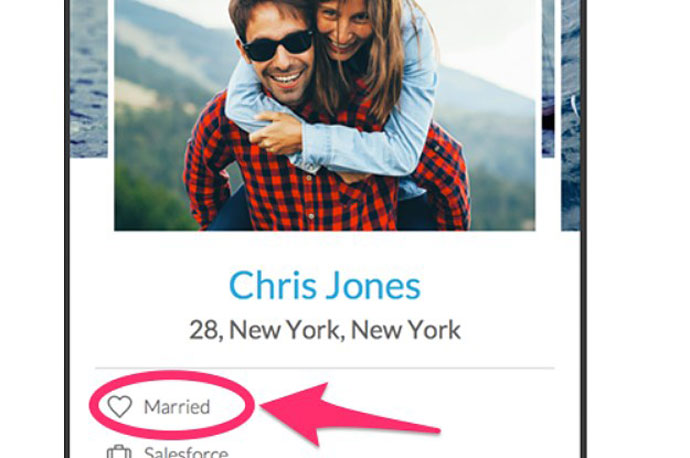When Did It Become OK? Casual Cheating And The World Of Dating Apps

Image via Hinge
You keep swiping left on Tinder, bored by all of the same pictures of girls making Kylie Jenner pouts into the camera. Then you stop. There’s a picture of a tan, toned brunette wearing a bikini. She’s got beautiful eyes, a bright smile, and wait… she loves “How I Met Your Mother,” spicy foods, shooting guns, working out, and big dogs. Just. Like. You. You swipe right and it’s a match.
As you start a conversation, you find out that she’s a professional cheerleader who does charity work in her spare time, and would love to grab dinner with you one night. You think it’s too good to be true… and you’re right.
Because “Jennifer from Tinder” is actually married, but you won’t discover that for many, many dates down the line, when she finally explains why she can only see you on weeknights.
That’s the magic of Tinder. It enables you to connect with a wide variety of people — including the married kind. When you’re married, it’s hard to sneak away from your spouse for long periods of time to head to a bar or club to meet people. Dating apps like Tinder and Hinge make it easy. You can meet new people on your phone while watching TV, or taking the train to work in the morning. You can set up a date, and tell your spouse you’re grabbing drinks after work. Then the hookups can ensue.
When Did Cheating Become OK?
A recent study by GlobalWebIndex found that a whopping 42 percent of people using Tinder are either in a relationship or married. Another dating app called Hinge found that 1.6 percent of its users were married or engaged, with another 2 percent in a relationship, according to their Facebook statuses. In all fairness, some of these statistics may point to married users who are not trying to cheat, but simply wish to play around with Tinder and “see what it’s all about.” Yes, apparently some people are just suffering from major FOMO and create accounts to see if people will swipe right for them.
However, some of these people actually are using the app to cheat; apparently, it’s a great way to do so. One website even recommends using Tinder to find an affair, considering it “the best thing to use.” The Huffington Post, meanwhile, calls Tinder “the perfect app for catching your cheating boyfriend.” This may be a joke, but it’s also true. There are numerous stories online of people using dating apps to initiate affairs of some kind.
Why is this a trend, now? When did cheating become so casual, simple, and convenient? The digital world has made it so.
People in relationships may begin using dating apps innocently enough, just to “see what it’s all about.” Then conversations begin, and to many, this seems harmless. A JDate/Christian Mingle report reveals that only about half of men actually consider flirtatious online conversation to be “unfaithful.” Sixty-eight percent of women think that it constitutes unfaithful behavior. But this kind of faceless, impersonal flirtation can lead to more. It may feel less scandalous than flirting with someone one night at a bar or club, but it can amount to the same final result: cheating.
Dating apps also make communication on the “down-low” much easier. Communication through the app makes it easier to keep conversations hidden. There are no ringing phones, no buzzing text messages, and there’s the added opportunity to communicate at all hours. No more late-night phone calls from your mistress, just a message on your phone that you can always respond to once you have privacy.
Cheating has also become more common because of the very existence of technology. According to one New York Times report, the numbers have gone up, in part, due to access to email, instant messaging, and cell phones that enable people to communicate throughout the day (like when they’re away from their spouses).
The whole impersonal quality of virtual messaging helps things along. Christian Mingle and JDate’s study also reveals that 41 percent of respondents think digital messaging makes it easier to flirt with someone else.
In other words, these apps are just part of the overall trend of technology making infidelity much easier.
The Apps Fight Back
Hinge is one app that’s ready to do something about it. Karen Fein, VP of marketing at Hinge, has decided to fight back to optimize the effectiveness of the app. She states that Hinge is “focused on helping people find relationships… any step towards increased trust and transparency is a good one.”
With that, Hinge plans to add users’ Facebook relationship statuses to their Hinge profiles. This could make a real difference. Anyone who changes their relationship status on Facebook to accommodate the new Hinge plan may raise red flags, especially with the spouse that they “unmarry” on Facebook.
This change will be part of Hinge’s 3.5 update, which does not yet have a release date. Some individuals may see Hinge’s update as a violation of privacy. After all, since when do apps need to have a moral code? At the same time, others may appreciate its protective measures, which only help those who are taking dating more seriously.
In the meantime, many online dating services and apps still remain a haven for people looking to cheat. The reality is, some people may cheat regardless of how difficult it is for them. But with technology making cheating easier — essentially at your fingertips — apps may need to start cracking down on people abusing their services. If not, those looking for a serious relationship could have an even harder time dating.







































